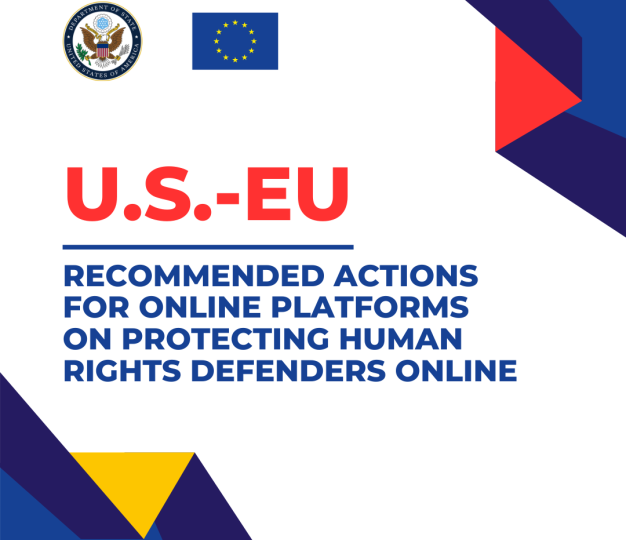Human rights defenders
Examples of Human Rights Defenders include journalists, bloggers, members of human rights NGOs, academics, lawyers, trade unionists, and representatives of indigenous communities.
Navigate the topic
Protecting human rights defenders online - 10 recommended actions
The EU – U.S. joint guidance for online platforms sets out 10 practical steps that platforms can take globally to prevent, mitigate, and provide remedy for attacks targeting human rights defenders (HRDs) online.
These recommendations reflect commitments made with global partners through the Declaration of the Future of the Internet.
Actions for human rights
10 actions that online platforms can take in partnership with stakeholders to improve HRD safety globally and to further respect for the human rights of all:
- Commit to an HRD Protection Policy
- Identify Risks to HRDs
- Exchange Information with HRDs, CSOs, and Industry Peers
- Create a Policy Implementation Plan to Mitigate Risk and Prevent Adverse Impacts with Monitoring Benchmarks to Measure Success
- Resource and Staff HRD Protection Efforts
- Build Capacity to Address Risks in Local Contexts
- Provide Safety Tools and Security Education to HRDs
- Create and Maintain Accessible Incident Reporting Channels for HRDs
- Contribute to and Provide Access to Remedy for HRDs
- Commit to Transparency, Public Reporting, and Continuous Improvement
To learn more, follow the link to download U.S. - EU recommended actions for online platforms on protecting Human Rights Defenders online
Huamn Rights Defenders (HRDs) often carry out their work at significant personal risk. In standing up against human rights violations committed by States and non-state actors, HRDs are constantly exposed to serious threats, including physical attacks, harassment, smear campaigns, arbitrary detention, transnational repression, surveillance, torture and killings.
Too often, human rights defenders are criminalised and labelled by governments as terrorists or criminals. The level of threats and violence faced by HRDs around the world remains alarmingly high. The latest report by Front Line Defenders (2025) documented 324 killings of HRDs in 32 countries in 2024.

Kamil Krawczak/Front Line Defenders, 2022
Image: More than 100 human rights defenders from around 100 countries gathered in Dublin 23-25 October, as part of Front Line Defenders’ flagship event, the Dublin Platform.
What do we do?
As set out in the EU Guidelines on Human Rights Defenders, the European Union is strongly committed to supporting HRDs at risk by enhancing their visibility, ensuring recognition for their work, and speaking out publicly against the threats they face.
Some of the EU’s key actions to protect HRDs include:
- Raising individual cases during human rights dialogues and subcommittee meetings.
- Issuing public statements on specific cases, including those involving killings or the arbitrary detention of HRDs.
- Monitoring trials and conducting visits in places of detention.
- Recognising HRDs through EU human rights awards (e.g. in Brazil, Honduras, Sudan, or Uganda), and running public campaigns in partnership with EU Member States to amplify their voices (e.g. in Colombia).
- Engaging in multilateral fora: sharing information with the UN Special Rapporteur on HRDs, referring to HRD cases in interactive dialogues, and inviting HRDs to speak at EU side events.
- Organising the EU-NGO Forum, which brings together over 100 HRDs in Brussels.
- Ensuring the daily engagement of EU Delegations, EEAS Headquarters, and the EU Special Representative for Human Rights with HRDs across the globe.
- Funding and managing ProtectDefenders.eu, the EU’s dedicated protection mechanism for HRDs (EUR 30 million for 2022–2027).
ProtectDefenders.eu, fully funded by the EU and managed by a consortium of international NGOs, provides emergency assistance, advocacy, and capacity building for individuals and organisations under threat because of their human rights work.
More specifically, it can provide:
- Emergency grants for relocation, legal assistance, medical care, or security measures.
- Temporary relocation programmes for individuals or families, both within their country and abroad.
- Financial and technical support for local human rights organisations facing pressure
- Training and capacity-building in security, advocacy, and psychosocial well-being.
Since 2015, the mechanism has supported more than 85,000 individuals, including over 10,000 people from 113 countries, between June 2024 and May 2025.

